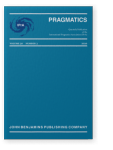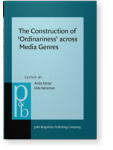Gonen Dori-Hacohen
List of John Benjamins publications for which Gonen Dori-Hacohen plays a role.
2020 The “Long List” in oral interactions: Definition, examples, context, and some of its achievements Pragmatics 30:3, pp. 303–325 | Article
This paper discusses lists, a neglected structure, to challenge taken-for-granted assumptions about them in oral interactions. Two such assumptions are: unlike narratives, lists are perceived as centered on the delivery of objective information; and three-part lists are normative. Using Israeli… read more
2019 “I can do math, but I’m not that smart. I’m not brilliant”: Ordinariness as a discursive resource in United States radiophonic financial call-in interactions The Construction of ‘Ordinariness’ across Media Genres, Fetzer, Anita and Elda Weizman (eds.), pp. 133–156 | Chapter
Radio call-in shows, mainly political ones, are prevalent in discursive research, dating back to Hutchby’s influential work. This chapter discusses the leading United States economic self-help radio call-in show, “The Dave Ramsey show” and how ordinariness is used in it. The host, Dave Ramsey,… read more
2017 Creative resonance and misalignment stance: Achieving distance in one Hebrew interaction Stance, resonance and the power of engagement, Nir, Bracha and Elisabeth Zima (eds.), pp. 16–40 | Article
This paper elaborates on one element of the theory of Dialogic Syntax, Du Bois’ main tool for stance-taking, namely creative resonance. The examples are taken from a recording of a car ride which was part of data collected for the analysis of Hebrew. The focus in the analysis is on misalignment,… read more
2014 Establishing social groups in Hebrew: ‘We’ in political radio phone-in programs Constructing Collectivity: 'We' across languages and contexts, Pavlidou, Theodossia-Soula (ed.), pp. 187–206 | Article
This chapter explores the Hebrew anaxnu (‘we’) in Israeli political radio phone-in programs. Using the ‘we,’ participants create or refer to seven social groups: the conversation ‘we’; the program ‘we’; the delimited social ‘we’; the opposing general ‘we’, the open general ‘we’; the humanity ‘we’;… read more
2013 The effect of irony in radio talk-back programmes in Israel The Pragmatics of Political Discourse: Explorations across cultures, Fetzer, Anita (ed.), pp. 193–217 | Article
Although generally considered to be highly influential, the discourse structure and practices of political talk radio have not yet been the subject of significant research. This paper examines one discursive practice, the use of irony, and how it functions in dialogues excerpted from an Israeli… read more
2011 “I have a question for you”: Practices for achieving institutional interaction in Israeli radio phone-in programs Pragmatics 21:4, pp. 527–548 | Article
Schegloff described utterances such as “lemme ask you a question” as pre-questions, pre-pre’s or pre-delicates (Schegloff 1980). This paper provides a discussion of similar utterances in a specific institutional setting - political radio phone-in programs in Israel. The participants use these… read more





